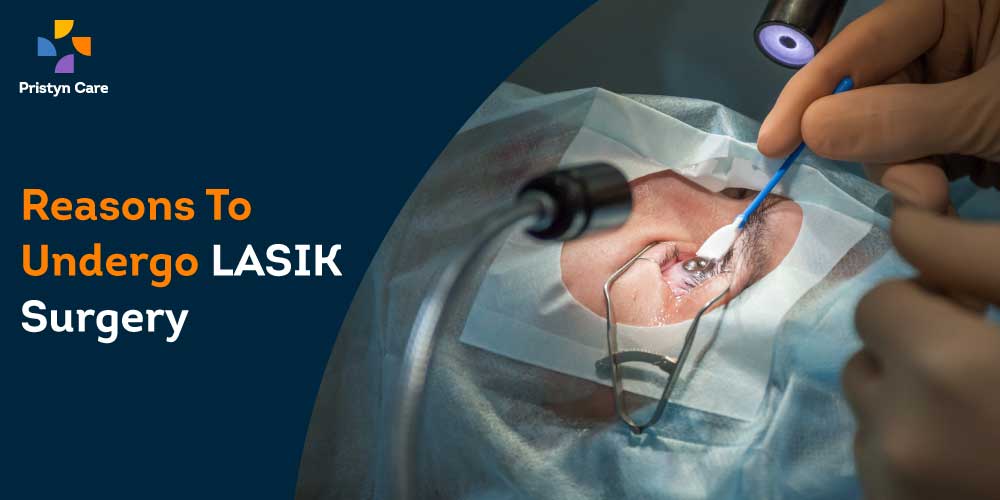
People of all ages at some point experience vision problems. Laser-assisted in situ keratomileusis or LASIK surgery is the third most popular surgical procedure after tooth extraction and cataract surgery all over the world. It is because of its safety, efficacy, reliability of results and its cost-effectiveness.
According to the American Academy of Ophthalmology, over 95% of people who undergo LASIK are able to see without glasses or contact lenses. Out of which 90% of people are able to achieve 20/20 vision which means that they can see clearly from a distance of 20 feet away and 99% of people end up with 20/40 or better vision.
What is Lasik surgery?
Laser-assisted in situ keratomileusis or LASIK is a vision correction surgical procedure in which laser technology is used to treats problems like:
- Myopia or nearsightedness: It is a condition in which you can clearly see things nearby but your vision becomes blurry when you look at things far away.
- Hyperopia or farsightedness: It is a condition in which your vision is sharp enough to look at things from a distance but it becomes hazy for nearby objects.
- Astigmatism: This problem causes blurry vision because of imperfections in the shape of the cornea .
In the procedure, the doctor flattens the eye and cuts a flap to reshape the central section of the cornea. The reformation of the tissue changes the way light is focused on the retina, making your vision clearer. However, it can take up to 6 months for your eyes to reach maximum clarity.
What is the best age for Lasik?
To be a good candidate for lasik one must ensure good health, free from any eye disease and a clear medical history. Age is one of the main factors that affects your candidacy for Lasik eye surgery.
- Children and teen: Under the age of 18 years
The eyes and its eyesight continue to grow and change until at least 18 years of age. Experts recommend that the vision correction surgery should not be performed until this age as the benefits of the surgery will be temporary and patients after sometime will need to go back to wearing prescription glasses.
- Adulthood: Between the age of 18-40 years
Although The FDA has approved LASIK surgery for patients of age 18 years and above. However, our vision generally fluctuates and changes until the age of 23 or 24, therefore it is best to wait for a few more years. By the age of 26 or 27, eyeglasses and contact lens prescriptions are most likely to be stable. A stable prescription is one of the characteristics of a good LASIK candidate. Ophthalmologists prefer to operate only once the vision is stable, since it ensures almost twenty plus years with no dependence on glasses or contact lenses .
However, those in military, police, and professional athletes receive special consideration.
- Middle age: 40-60 years
A patient’s eye begins to change again around the age of 40s. As presbyopia begins to appear, you are more likely to need a pair of reading glasses at this time. If you are healthy and have no history of medical problems then after a proper eye exam and consultation from the doctor, you may be considered as an ideal candidate for Lasik surgery. For this age group; family history of corneal disorders, glaucoma and diabetes are also considered.
Alternatively, the doctors sometimes advise the patients to get monovision. Although it is not a perfect solution for presbyopia. In monovision one of your eye is set for distance focus and the other eye set is set to focus on the nearby objects. Monovision is very successful 85% of the time. After monovision, you can read the menu without contact lenses and glasses, watching TV and driving legally are realistic
- Old Age: 60 years and above
There is no upper limit preventing seniors from undergoing LASIK eye surgery, but many factors must be taken into consideration before senior adults are approved as good and ideal candidates.
Cataracts, is a common eye disease that affects senior adults and is one of the reasons patients are considered ineligible for Lasik surgery. In this case, the doctor recommends cataract surgery. However, this does not exclude the patient from undergoing a Lasik or any other refractive eye surgery in the future. The patients must also understand that it is natural and inevitable for their eyesight to become hazy, blurred and cloudy as their vision develops with age, and lasik surgery can not prevent this.
Apart from this, if the patients do not have any pre-existing conditions like glaucoma or age-related macular degeneration, and are of good health then they can safely undergo LASIK surgery. The patient must, however inform the surgeon in advance about the medications they are taking to avoid the risks and complications during or after the surgery.
With the development and advancement in technology and healthcare industry and the emerging variations of performing Lasik surgery, the age criteria for LASIK are more relaxed in today’s date.
The success of Lasik eye surgery depends on a comprehensive eye examination and the consultation of the doctor. Don’t let your age stop you from seeking consultation from the eye surgeon.
Book your appointments today at Pristyn Care. We at Pristyn Care, provide you with trained and experienced ophthalmologists to guide you and help you determine if Lasik surgery is the best option for you.







